Weaponized Sympathy for a Despised Pseudo-Profession
By Ryan Delarme, BADLANDS MEDIA 10 April 2024

A subset of the American population has developed the conviction that they alone should possess the authority to pronounce what is and isn’t objective truth, and what kind of online discourse should be permitted.
One of these individuals is a member of the Cybersecurity & Infrastructure Security Agency (CISA) named Kate Starbird.
We’re going to take a look at Starbird’s career, her political stance, and a recent edition of 60 Minutes where they attempted to portray her as some victimized superhero, and we’re going to speak more broadly about the philosophical implications of giving somebody the ability to unilaterally decide what is and isn’t the truth.
A variety of organizations have emerged in American political life over the past decade or so that operate in concert to implement an institutionalized form of online censorship. This unofficial network has been referred to as the censorship industrial complex, and it works directly with the federal government to stifle any dissent deemed dangerous to the objectives of the U.S. Security State.
The individuals who make up this network often first emerge from the U.S. government, typically from Homeland Security itself.
For example, an endeavor undertaken by the Department of Homeland Security to establish an internal departmental “Ministry of Truth” called the Disinformation Governance Board (DGB) a year ago sparked a significant scandal.
Maybe you recall Nina Jankowicz (aka Scary Poppins); the stable, unbiased individual tasked with heading up that prestigious board.
Jankowicz is a quintessential “resistance liberal” who is quite vocal about her position; a brief glimpse at what she posts on social media will show you that she’s essentially Taylor Lorenz on crack. This woman is the perfect case study to support the idea that maybe these disinformation experts aren’t quite as qualified to be the unbiased arbiters of truth that they are presented as.
The “Scary Poppins” PR disaster caused the DGB endeavor to be shut down, but these efforts have only temporarily receded; Western governments are still working with various organizations funded by neoliberal billionaires to make the idea of an official “ministry of truth” type board a reality. Additionally, new legal frameworks designed to facilitate censorship have already been adopted in Canada, the United Kingdom, and the entire European Union.
The connections shared by many so-called disinformation experts to the Intelligence Community and Homeland Security are palpable red flags, but if you remove all of that from the equation, there’s still plenty of reasons why Americans should be skeptical of this relatively young profession.
What is it about these people that qualifies them for this position? Are they just vested with extreme competence and superior character than the rest of us plebs?
Free speech allows us to hear multiple interpretations and decide for ourselves what makes the most sense. Naturally, not everyone is going to be right all of the time; even the most intelligent person on the planet is going to be wrong sometimes, but being wrong is a blessing because we learn from the experience and sharpen our epistemological faculties.
Those individuals are not interested in that.
Their true desire is for the state-given capacity to enforce their decrees regarding veracity and falsity so that any viewpoint they deem false, imprecise, or unsupported can be surgically eliminated from public discourse. The most concerning part of all of this is that a sizable portion of our society now feels that we should not only accept, but rather actively promote this kind of systemic censorship.
Below, we have one example among many that showcases my point. It comes from August 2021 Pew Research, and poses two distinct queries:
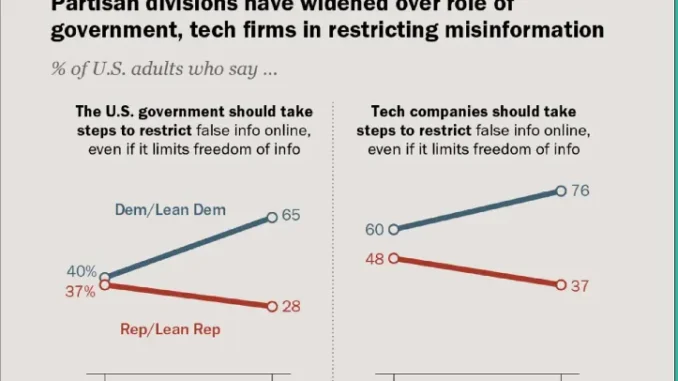
They polled Americans, and they said, “Do you want the government controlling and limiting the flow of information online in the name of keeping you safe from disinformation, even if it means limiting free speech?”
65% of Democrats said yes, they want the government to perform that function. And 28% of Republicans—a much lower number, but still one out of every four—believe that the government has the right and should be performing this function.
The results of the second question are even more alarming:
76% of Democrats—3 out of every 4—want social media platforms to censor political views or political expression in the name of preventing disinformation, and 37% of Republicans—a very sizable and noteworthy minority—also believe this is acceptable and even pertinent.
So, despite the oral arguments against state-sponsored censorship, it is undeniable that a significant portion of American citizens want this sort of thing to be allowed. And so the question then arises: who is competent enough to identify disinformation not just for the sake of dissuading you from believing it, but for the sake of preventing you from expressing certain views or hearing others express those views?
The concept of a “disinformation expert” is a completely new idea—a freshly invented expertise that did not exist until about seventeen seconds ago. Contrary to what most might expect, there’s no real industry standard for how one ascends to this position; there’s no discipline or structured pathway in academia to achieve this highly consequential designation.
We’ve always had experts and “authorities” on various subjects, but never before in human history have we deemed somebody an expert on all subjects.
So who are these inhuman wizards, these magnanimous founts of perfect knowledge?
Kate Starbird, much like Nina Jankowicz, is another individual who has ascended to the lofty perch of disinformation expert.
60 Minutes, a program that has a long history of delivering establishment propaganda, recently ran a segment on Disinformation featuring the stalwart Starbird in between peddling debunked conspiracy theories about Russia using directed frequency weapons to target NATO officials.
Here is a clip from the beginning of the segment that frames the discussion:
You’ll notice, unsurprisingly, that they frame this conflict of truth vs. falsity as a Liberal vs. Conservative issue. It’s only the unclean conservatives who are concerned with the marriage between Big-Tech, the Federal Government and these newly materialized fact-checking organizations.
It’s worth noting here that, during the pandemic, there were all kinds of claims being flung around, not just by the citizenry but by the legacy media institutions and even the CDC itself; many of these claims ended up not being true.
The segment goes on to introduce our heroine, Kate Starbird:
So here we have an academic from Stanford being featured on 60 Minutes as some kind of virtuous defender against the evils of disinformation.
You’re about to hear how she’s being victimized and targeted, how people are criticizing her on the internet, and how it’s presented as some sort of terrible event that we all need to lament.
60 Minutes makes it seem as though we should all be applauding this woman and thanking her for her vital service, and yet, rather than venerating her, people are rightly questioning whether or not this is a function that Kate Starbird has the right to perform.
The segment continues:
Host: I understand that some of the researchers, including you, have had some threats against them, death threats.
Starbird: I have received one. Sometimes they’re threats with something behind them, and sometimes they’re just there to make you nervous.
This woman, whom 60 minutes really wants us to focus on and empathize with, has received a grand total of one death threat.
I’d really like to see the purported death threat, as not all “death threats” are created equal. Anyone who has played online video games has likely received a death threat. It is extremely common for people like this to victimize themselves in this way.
Journalists like WikiLeaks founder Julian Assange or Glenn Greenwald, who broke the Snowden stuff, regularly receive threats so serious for the journalism that they have done exposing state secrets that they and their families require constant security measures. Those are the people we should be empathizing with, not Kate Starbird.
Host: This campaign against you is meant to discredit you, so we won’t believe you.
Starbird: Absolutely. It’s interesting that the people that pushed voter fraud lies are some of the same people that are trying to discredit researchers that are trying to understand the problem.
You have the right to discredit researchers. You have the right to challenge Kate Starbird’s decisions. What world is this woman living in if she believes that people do not have the right to criticize her?
Just as they did with the fallout over Nina Jankowicz, they are trying to once again use the fact that people do not trust the Kate Starbirds of the world as supporting evidence for the idea that we need disinformation experts now more than ever.
That is the full objective of this ridiculous segment.
Of course, they go on to further hammer home the idea that this problem is exclusive to conservatives.
Starbird made another mainstream appearance recently in a Guardian article at the beginning of the year titled, ‘
Stakes are Really High’: misinformation researcher changes tack for 2024 US election.These are people who we’re told are politically neutral—both the big-brain journos at the Guardian and the disinformation experts they celebrate, yet in every example we could provide, their attacks are focused exclusively on the populist right. There is never a purported falsity that they push back against originating from the Washington establishment, which you could argue is the purveyor of the most consequential lies.
As per the article:
Starbird, a misinformation researcher, herself became the subject of an ongoing misinformation campaign – but said she would not let that deter her from her research. Her team wasn’t the only target of the conservative campaign against misinformation research, she noted: researchers across the country have received subpoenas, letters and criticism, all attempting to frame misinformation research as partisan and as censorship.
What kind of inhuman ghoul would ever dare question the sanctity of a disinformation expert like Kate Starbird? What supernatural evil spurs these citizens into disagreeing with or criticizing her decrees?
As you might have suspected, Kate Starbird is far from politically neutral. Even pretending that she doesn’t have an overt political agenda is an insult to the intelligence of anyone who has spent more than five seconds looking into this woman’s outward persona.
The post below was made on Facebook on October 31, 2018, right before the midterm election that year, and this is what this apolitical, neutral seeker of the truth wrote to her followers on Facebook, summarized below:
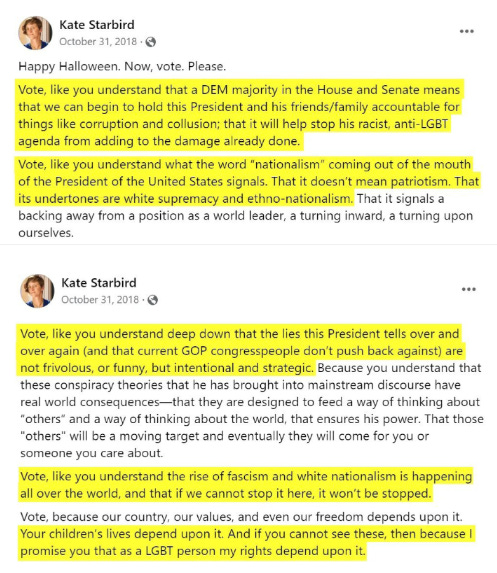
Happy Halloween. Now, vote. Please.
Vote, like you understand that a DEM majority in the House and Senate means that we can begin to hold this President and his friends/family accountable for things like corruption and collusion; that it will help stop his racist, anti-LGBT agenda from adding to the damage already done.
Vote, like you understand what the word “nationalism” coming out of the mouth of the President of the United States signals. That it doesn’t mean patriotism. That its undertones are white supremacy and ethno-nationalism. That it signals a backing away from a position as a world leader, a turning inward, a turning upon ourselves.
Vote, because I know you understand that the tax cuts they gave to the most wealthy among us have turned into huge debt that will be paid by the rest of us for generations to come.
Vote, because I’m sure you can see how the GOP rhetoric around health care is meant to deceive and that their planned agenda is to push us back towards a time when people like my wife, with a pre-existing condition, will not be able to afford insurance or the care she needs.
Vote, like you understand deep down that the lies this President tells over and over again (and that current GOP congresspeople don’t push back against) are not frivolous, or funny, but intentional and strategic. Because you understand that these conspiracy theories that he has brought into mainstream discourse have real world consequences—that they are designed to feed a way of thinking about “others” and a way of thinking about the world, that ensures his power. That those “others” will be a moving target and eventually they will come for you or someone you care about.
Vote, like you understand the rise of fascism and white nationalism is happening all over the world, and that if we cannot stop it here, it won’t be stopped.
Vote, because our country, our values, and even our freedom depends upon it. Your children’s lives depend upon it. And if you cannot see these, then because I promise you that as a LGBT person my rights depend upon it.
This isn’t the time for old political party divisions. We are facing a wholly different kind of threat. And I implore you to vote like you understand this. For my friends who are conservatives, if you’d like a list of several long-time conservatives who are advocating for a similar voting strategy in this election—let me know, and I can point you to them.
Do these sound like the words of a nonpartisan individual? Did anything in that monstrosity of text create a sense of comfort and assurance that this person would be able to put aside her biases and judge fairly in all matters?
Interestingly enough, in one of the first paragraphs of the text above, we see this expert in truth and falsity claiming that Donald Trump was “accountable for things like corruption and collusion.” It’s safe to assume that, since the Mueller investigation was still plodding along at that point, she’s referring to the thoroughly debunked allegations that Donald Trump colluded with the Russian government to get elected in 2016.
The real problem with this statement is that Starbird didn’t say ‘he MAY be guilty’ or ‘has been accused of.’ She basically conducted herself as though it were written in stone that Trump did these things, which not only turned out to be not the case, but ironically, the whole fiasco itself was the product of misinformation in the Steele Dossier.
Starbird has since never retracted this post, apologized or even acknowledged the findings of Robert Mueller, which means, as far as we all know, she still believes the Russia collusion fairytale.
Further, she goes on to express her opinions as though they were facts, saying things like “Vote, like you understand what the word “nationalism” coming out of the mouth of the President of the United States signals. That it doesn’t mean patriotism. That its undertones are white supremacy and ethno-nationalism.”
This is Kate Starbird’s highly uncritical opinion, and yet, we are supposed to trust her?
One of the complaints that “60 Minutes” made was that only 30% of the time Twitter was responding to Starbird’s requests to remove information. This is further proof that the mainstream media has a stake in the game as well, no one is tuning in anymore, just like no one is willing to allow the Kate Starbird’s of the world to dictate what opinions should and shouldn’t even be allowed to be expressed.
All of that being said, there is a huge problem with disinformation, both in the mainstream and the independent media. So many demonstrably false claims are peddled as ultimate facts. It’s an unfortunate reality, but it’s true.
However, the danger of censorship will always outweigh the danger of free speech. Bad information should be allowed to be broken down and debated in public, where everyone’s understanding of the truth can be enriched and additional opinions can be offered.
Hopefully the job title of “disinformation expert” is one that we can soon consign to the trash heap of history.

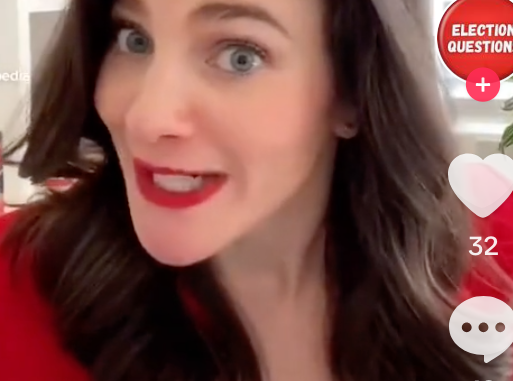
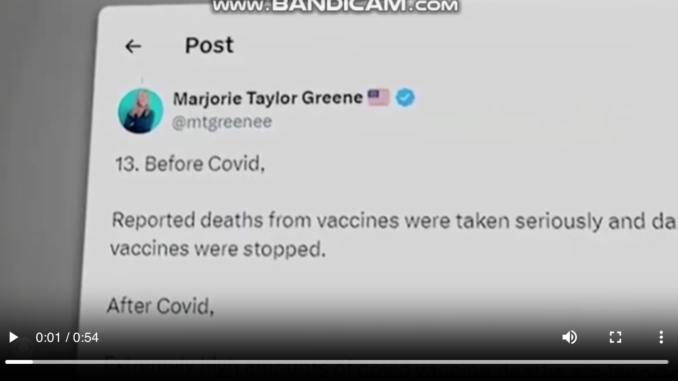
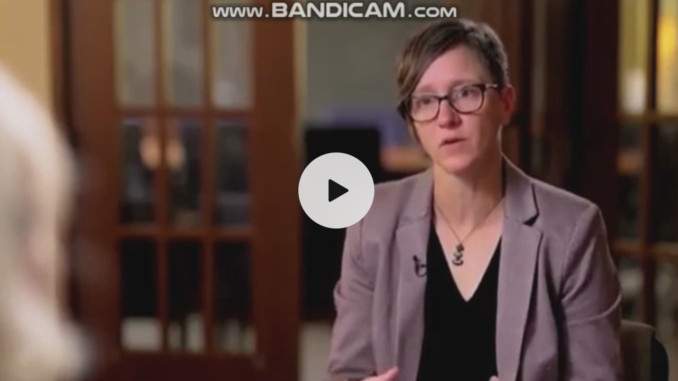



Leave a Reply
You must be logged in to post a comment.